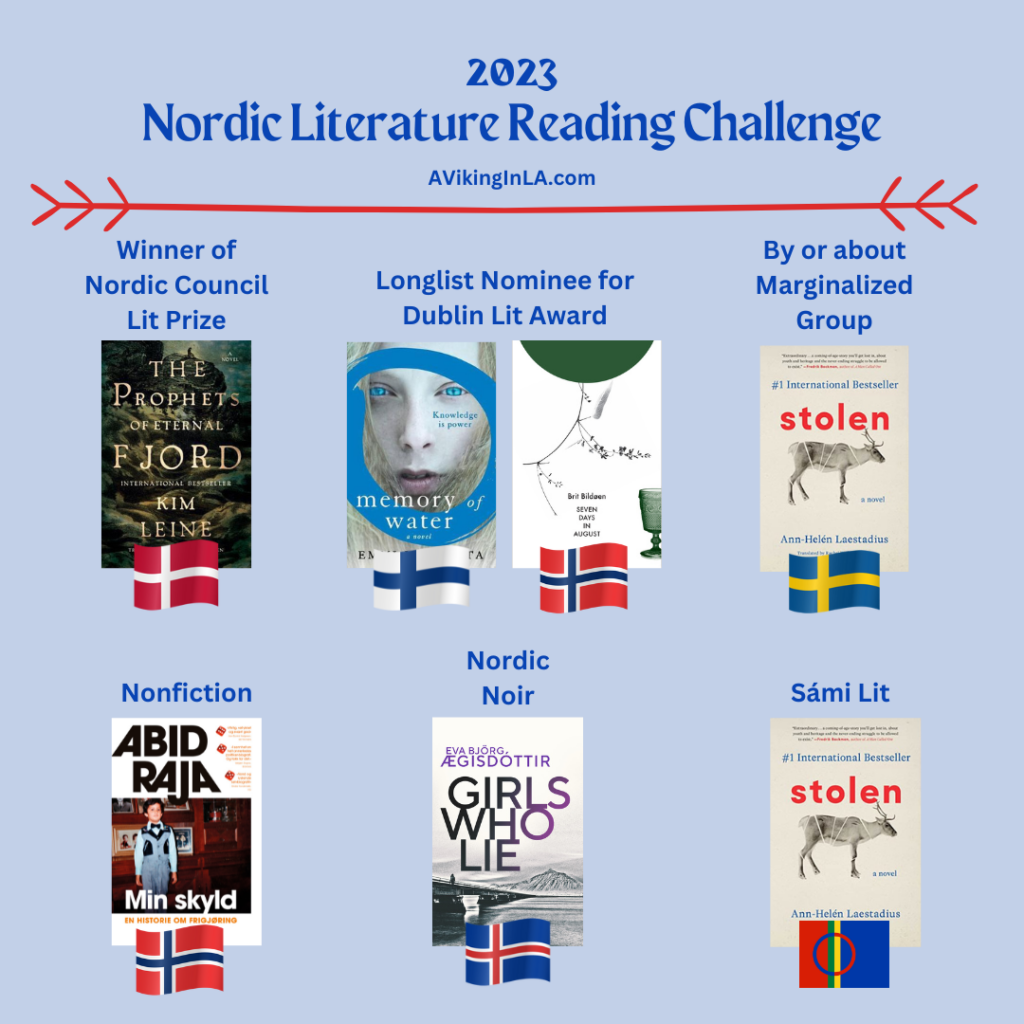
I didn’t quite complete my 2023 Nordic Literature Reading Challenge as planned – a unique Nordic country for each of the six categories – but I still felt good about how it played out.
What I thought would be a simpler approach with fewer categories (in the past it’s been 12) turned out to require too much research and planning for all the pieces to fall into place. Also, I was distracted by new reading challenges.
I did read two new-to-me Nordic authors, Denmark’s Kim Leine and Finland’s Emmi Itäranta. I also read two Norwegian authors long on my radar, Brit Bildøen and Abid Raja, as well as a highly anticipated Swedish Sámi novel. Looking back now, all I needed to do for the pieces to fall into place as planned was to read a Swedish book by or about a marginalized group or another book by or about the Sámi people and their history and culture, fiction or nonfiction.
Winner of the Nordic Council Literature Prize — Denmark — The Prophets of Eternal Fjord by Kim Leine, translated from the Danish by Martin Aitken
 I was so intrigued and hopeful about this book. The time and places were new to me; I had no familiarity with this chapter of Denmark’s past, the late 18th century in Copenhagen and Greenland when missionaries went to convert the Greenlandic Inuits to Christianity. Also, it’s a multiple prize-winning book. Besides winning the Nordic Council Literature Prize in 2013, it also won the Danish literature prize, De Gyldne Laurbær, in 2012. Additionally, it made the shortlist for the Dublin Literature Award in 2017. Considering it was recognized for these prizes as well as others, I’m surprised and disappointed that I ended up not finishing it. I got just about 50% through this 576 page novel (tried both audio and ebook versions) so I feel I have a legitimate impression of both the book and the time and place it was about. Unfortunately, both the structure of the plot (jumps in time) and style of the writing (no quotation marks) were problematic for me. On top of this, the characters and events of the book were at times unnecessarily brutal and repulsive.
I was so intrigued and hopeful about this book. The time and places were new to me; I had no familiarity with this chapter of Denmark’s past, the late 18th century in Copenhagen and Greenland when missionaries went to convert the Greenlandic Inuits to Christianity. Also, it’s a multiple prize-winning book. Besides winning the Nordic Council Literature Prize in 2013, it also won the Danish literature prize, De Gyldne Laurbær, in 2012. Additionally, it made the shortlist for the Dublin Literature Award in 2017. Considering it was recognized for these prizes as well as others, I’m surprised and disappointed that I ended up not finishing it. I got just about 50% through this 576 page novel (tried both audio and ebook versions) so I feel I have a legitimate impression of both the book and the time and place it was about. Unfortunately, both the structure of the plot (jumps in time) and style of the writing (no quotation marks) were problematic for me. On top of this, the characters and events of the book were at times unnecessarily brutal and repulsive.
Longlist Nominee for Dublin Literature Award #1 — Finland — Memory of Water by Emmi Itäranta
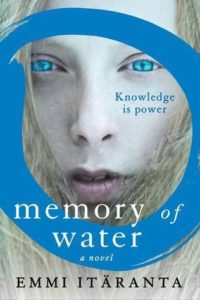 This story is set in the Scandinavian Union years in the future in a Europe ruled by China where climate change and rising seas have destroyed cities and fresh water is extremely scarce and controlled by the military. Noria is a seventeen-year-old girl who has followed in her father’s footsteps to become a tea master. When her father dies, the responsibilities and secrets that came with that role become harder to maintain, and Noria has to make difficult decisions. Noria is a likable and engaging character, and the world building is interesting and creative (though there are some holes and unanswered questions about how their world really came to be in such a way). In particular, I enjoyed the scene of the Moonfeast, when a viewing of the Northern Lights was infused with Chinese culture and ocean-themed references. I could see it being a beautiful scene in a movie (which was released in the fall of 2022).
This story is set in the Scandinavian Union years in the future in a Europe ruled by China where climate change and rising seas have destroyed cities and fresh water is extremely scarce and controlled by the military. Noria is a seventeen-year-old girl who has followed in her father’s footsteps to become a tea master. When her father dies, the responsibilities and secrets that came with that role become harder to maintain, and Noria has to make difficult decisions. Noria is a likable and engaging character, and the world building is interesting and creative (though there are some holes and unanswered questions about how their world really came to be in such a way). In particular, I enjoyed the scene of the Moonfeast, when a viewing of the Northern Lights was infused with Chinese culture and ocean-themed references. I could see it being a beautiful scene in a movie (which was released in the fall of 2022).
Longlist Nominee for Dublin Literature Award #2 — Norway — Seven Days in August by Brit Bildøen, translated from the Norwegian by Becky L. Crook
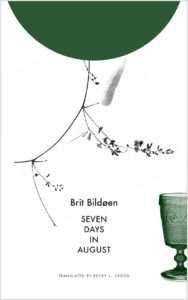 This novel takes place in Oslo eight years after the horrendous July 22, 2011, terrorist attack on a youth camp on the island of Utøya. A mother is still struggling with the loss of her daughter. The extent of the grief and sorrow becomes apparent as she and her husband deal with a series of unlucky events that happen over the course of a week — a tick bite, a storm, a fall, among other things. Throughout the days, details trigger memories of the day her daughter was killed. It’s about how grief takes hold and never completely goes away and affects the relationships around you. The main characters, their relationship, and the situations they find themselves in are so realistically portrayed. It’s an engaging, page-turning reading experience despite its heavy and difficult subject matter.
This novel takes place in Oslo eight years after the horrendous July 22, 2011, terrorist attack on a youth camp on the island of Utøya. A mother is still struggling with the loss of her daughter. The extent of the grief and sorrow becomes apparent as she and her husband deal with a series of unlucky events that happen over the course of a week — a tick bite, a storm, a fall, among other things. Throughout the days, details trigger memories of the day her daughter was killed. It’s about how grief takes hold and never completely goes away and affects the relationships around you. The main characters, their relationship, and the situations they find themselves in are so realistically portrayed. It’s an engaging, page-turning reading experience despite its heavy and difficult subject matter.
Nonfiction — Norway — Min skyld: En historie om frigjøring (My Fault: A Story of Liberation) by Abid Raja
 This is a very honest and open memoir – he shares difficult things! – by a Norwegian lawyer, liberal party politician, and current Member of Parliament with a minority background. It’s about his “liberation from shame, guilt, and outsiderness” as the book jacket states. Born in Norway in 1975 to Pakistani immigrants and with a rare birth defect, he faced great challenges growing up. This is the story of how he overcame those challenges, which included a few years in the child welfare system, and went on to study law at the University of Oslo and found the love of his life, a fellow Norwegian Pakistani. I admired his honesty when revisiting his past and confronting his opposing cultures – the patriarchal Pakistani culture and Islamic religion in which he was born and the liberal Norwegian society in which he lived. It was an eye-opening look at a segment of Norwegian society which I am not familiar with and that I greatly appreciated.
This is a very honest and open memoir – he shares difficult things! – by a Norwegian lawyer, liberal party politician, and current Member of Parliament with a minority background. It’s about his “liberation from shame, guilt, and outsiderness” as the book jacket states. Born in Norway in 1975 to Pakistani immigrants and with a rare birth defect, he faced great challenges growing up. This is the story of how he overcame those challenges, which included a few years in the child welfare system, and went on to study law at the University of Oslo and found the love of his life, a fellow Norwegian Pakistani. I admired his honesty when revisiting his past and confronting his opposing cultures – the patriarchal Pakistani culture and Islamic religion in which he was born and the liberal Norwegian society in which he lived. It was an eye-opening look at a segment of Norwegian society which I am not familiar with and that I greatly appreciated.
Nordic Noir — Iceland — Girls Who Lie (Forbidden Iceland, #2) by Eva Björg Ægisdóttir, translated from the Icelandic by Victoria Cribb
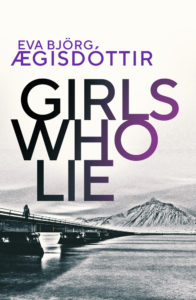 Iceland’s location and geography make for such a fascinating setting and are often a significant aspect of stories set there. That is certainly the case in this series which takes place outside of Reykjavik along the western coast. The author skillfully incorporates changing weather and unique geographical features into the stories. I really enjoyed the first in the Forbidden Iceland series, The Creak on the Stairs. However, this second one didn’t quite do it for me. It began slowly and there were what I considered mundane and unnecessary details. Unfortunately, I was not attentive enough while reading, and the twist did not unfold for me in a satisfying way — more confusion than a-ha moment — and this frustrated me. Though I can certainly see how attentive reading could yield a satisfying, or even thrilling, reading experience so I haven’t written off the next in the series.
Iceland’s location and geography make for such a fascinating setting and are often a significant aspect of stories set there. That is certainly the case in this series which takes place outside of Reykjavik along the western coast. The author skillfully incorporates changing weather and unique geographical features into the stories. I really enjoyed the first in the Forbidden Iceland series, The Creak on the Stairs. However, this second one didn’t quite do it for me. It began slowly and there were what I considered mundane and unnecessary details. Unfortunately, I was not attentive enough while reading, and the twist did not unfold for me in a satisfying way — more confusion than a-ha moment — and this frustrated me. Though I can certainly see how attentive reading could yield a satisfying, or even thrilling, reading experience so I haven’t written off the next in the series.
Sámi Lit & By About a Marginalized Group — Sweden — Stolen: A Novel by Ann-Helén Laestadius, English translation by Rachel Willson-Broyles
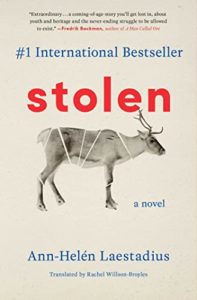 I really enjoyed and appreciated this book, a window into a culture that I’m very intrigued by. I admired and cared for the characters, the story was very engaging, the setting of Arctic Sweden was unique, and the insight into contemporary Sámi culture and issues was fascinating as well as infuriating. In addition to highlighting the discrimination and prejudice the Sámi face, the story touches upon the effect of climate change on reindeer herding, mental health of Sámi people, and expected gender roles within the Sámi communities as well. It was an engaging and powerful read that left impressions that will stay with me for a long time. Read more about the book’s story in Reading Lately, April 2023. (Netflix produced a film adaptation directed by Ella Márjá Eira which released April 12, 2024.)
I really enjoyed and appreciated this book, a window into a culture that I’m very intrigued by. I admired and cared for the characters, the story was very engaging, the setting of Arctic Sweden was unique, and the insight into contemporary Sámi culture and issues was fascinating as well as infuriating. In addition to highlighting the discrimination and prejudice the Sámi face, the story touches upon the effect of climate change on reindeer herding, mental health of Sámi people, and expected gender roles within the Sámi communities as well. It was an engaging and powerful read that left impressions that will stay with me for a long time. Read more about the book’s story in Reading Lately, April 2023. (Netflix produced a film adaptation directed by Ella Márjá Eira which released April 12, 2024.)

